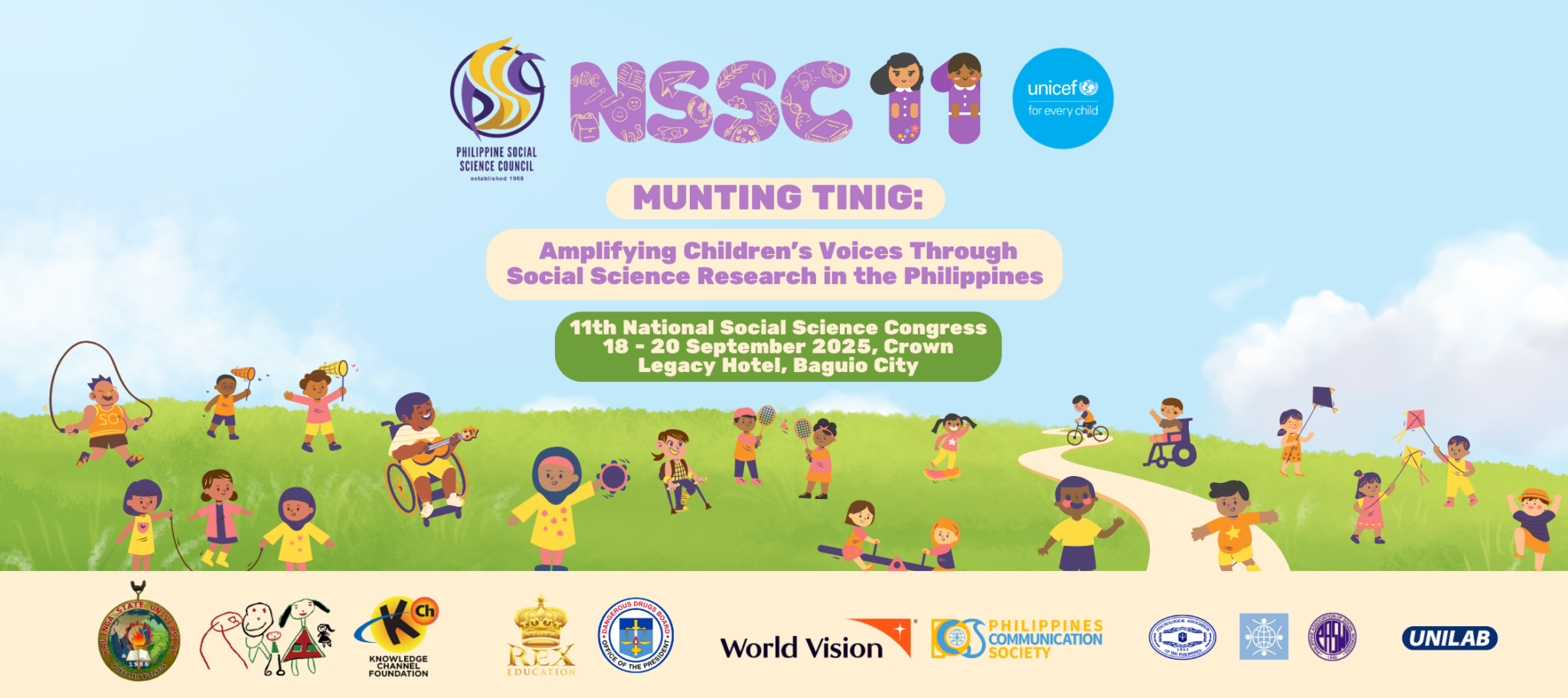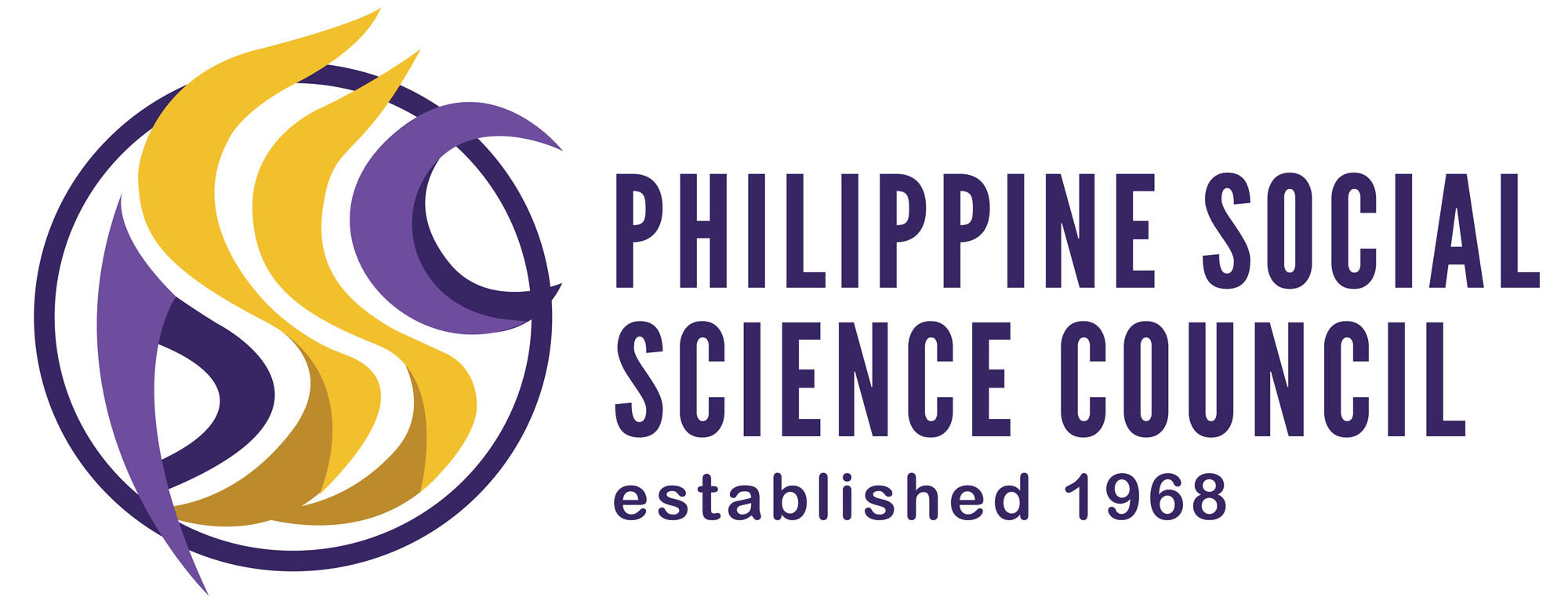
11th National Social Science Congress (NSSC11)
18 - 20 September 2025, Crown Legacy Hotel, Baguio City
The Philippine Social Science Council (PSSC), in partnership with the UNICEF Philippines, will be holding the 11th National Social Science Congress (NSSC 11) on 18-20 September 2025 at the Crown Legacy Hotel in Baguio City. The NSSC11 will adopt the theme, “Munting Tinig: Amplifying Children’s Voices through Social Science Research in the Philippines.”
The NSSC11 will feature research studies that center on children using social science lenses and methodologies to explore critical areas such as education, health, rights and protection, among others. By amplifying children’s voices in research, the theme underscores the potential for more inclusive and effective policies that directly address the unique challenges faced by children in the Philippines. Recognizing that children in today’s context are limited to their “munting tinig” due to political and economic barriers, social exclusion and marginalization, as well as hierarchical structures, NSSC11 seeks to intensify their voices and bring to light critical issues through social science research; thus, enabling them to participate in their affairs and empowering them in the process as development stakeholders and social actors.
By encouraging social science research to focus on children’s voices, the PSSC aims to build on the progress the Philippines has already made in protecting and promoting children’s rights and well-being. (As per Section 3(a) of RA 7610, child refers to a person below eighteen (18) years of age or those over but are unable to fully take care of themselves or protect themselves from abuse, neglect, cruelty, exploitation or discrimination because of a physical or mental disability or condition. Furthermore, the United Nations Convention on the Rights of the Child (1990) emphasized that all the “best interests of the child shall be a primary consideration” in all activities involving children).
As reported in the Situation Analysis of Children in the Philippines (2023), there has been a decrease in stunting, as well as in under-5 mortality (National Demographic and Health Survey, 2022). A significant increase in access to basic drinking water and sanitation by households has been noted. For primary-school-age children, attendance in school is high. Key legislations to protect child rights have been passed along with increasing public spending for key social sectors, particularly in education.
However, there are persistent challenges. Based on the Expanded National Nutrition Survey (2018), the triple burden of malnutrition remains a key issue of concern, with a high level of stunting (26.7%). Neonatal deaths account for half of all deaths of children under the age of 5 years. According to the National Demographic and Health Survey (2022), twenty-three per cent of children aged 2–5 years were not on track in terms of growth, learning and psychosocial well-being in 2022, including 26% of boys and 34% of the poorest children.
The South East Asia Primary Learning Metrics demonstrated that in 2019, 83% of Grade 5 students had not reached minimum proficiency in mathematics and 90% in reading. Based on data from the Philippine Statistics Authority, child poverty is 26.4% in 2021 and rising from 23.9% in 2018, leaving over 10 million children at risk of being left behind. Data show that children who grew up in poverty often face significant health and educational challenges. The Commission on Population and Development reported that malnutrition, for instance, often leads to poor performance in schools, which can further result in an adverse life-cycle development.
Such a situation is reflected in the learning poverty rate of the country, estimated at 90.9 percent, according to the World Bank’s 2022 “The State of Global Learning Poverty”. This means that nine out of ten 10-year-old Filipino children and adolescents are unable to read and understand a simple text. The World Bank validates the country’s performance in international large-scale assessments, as the Philippines ranks the lowest overall among all countries assessed. For instance, in the 2018 Programme for International Student Assessment (PISA), the Philippines ranked 76th out of 76 countries in Reading, 75th out of 76 countries in Math, and 76th out of 77 countries in Science. In the Trends in International Mathematics and Science Study (TIMSS) assessment, the Philippines also ranked the lowest (among 58 countries) in both Math and Science.
The recent comprehensive analysis of the situation of children in the Philippines revealed that there are significant gaps in evidence and knowledge, pointing to the need for stronger collaboration and targeted research to support child rights monitoring and evidence-based interventions. For instance, there are key gaps in evidence on the situation of children on mental health, the impact of climate on children, child participation as well as violence against children. Understanding key barriers and bottlenecks in the implementation of policies also remains a challenge, particularly in key areas where children’s rights are not fulfilled. Boosting social science research is also essential in better understanding the relevance, efficiency, and effectiveness of key programs and projects and identifying innovative approaches to accelerate results for children.
The Philippines boasts a rapidly growing research community, including academic institutions, public and private research organizations, development partners, and civil society. These groups have produced insightful studies that have significantly informed policy decisions in the country. However, the opportunities for these stakeholders to come together, share knowledge, and collaboratively address pressing issues have been sporadic and lack a consistent framework. This NSSC11 can play a pivotal role in bridging this gap. By providing a formal platform for sustained dialogue and collaboration and leveraging the influence of the PSSC’s network of social scientists, this gathering can catalyze more effective partnerships and contribute to more impactful, evidence-based policy-making.
Conference Subthemes
Now in its 11th gathering, the NSSC invites social scientists, scholars/experts, researchers, academics, policymakers, legislators, government officials, donor agencies, and civil society organizations to be involved in children’s discourse by sharing the results of their research. The research may fall within any of the existing discussion panels or sub-themes:
I. Child's Right to Life and Survival
- Climate crisis displacement and its effect on children
- Access to clean and safe water for children
- Effect of food insecurity on children
- Disaster education and disaster preparedness among children
- Community-based services in promoting stable, nurturing environments for children to thrive
- Children in post-transition Bangsamoro
- Narratives of violence and abuse related to children
- Children’s concept of peace and security
- Mental health of children in the Philippines
- Trauma-informed care and mental health support for children affected by domestic violence, displacement, or natural disasters
- Well-being of children in various settings (street situations, schools, foster care, and residential care facilities)
- Children’s geographies and well-being
- Effects of poverty, urban-rural divides, and regional disparities on Filipino children’s health and well-being
- Cultural preservation among children
- Impact of mother tongue education policies in the Philippines
- Approaches to teaching language to children with special needs
- Integrating local histories into formal education to promote cultural identity and diversity
- Happiness economics
- Efficient and effective healthcare provision
- Research and development in medicine
- Poverty and health
- Economic burden of diseases
II. Child's Right to Development
- Access to quality education for children belonging to marginalized groups
- Effects of poverty, urban-rural divides, and regional disparities on Filipino children’s education and opportunities
- Teaching history in basic education: issues and challenges
- AI learning in Early Childhood Education
- Effects of distance learning during the pandemic on learner improvement
- Children’s conception of AI
- Ethical use of AI involving children
- Statistical analysis of educational outcomes for Filipino children
- Quantitative methods in assessing the impact of socioeconomic factors on child development
- Statistical framework on Children Indicators
- Population growth and their impact on children’s access to resources
- Changes in family structures and the children’s well-being and development
- Identity formation in children as influenced by social media/ mass media
- The Girl Child and non-binary children
- Increasing pregnancy among children aged 10-14
- Children’s idea of gender roles and sexual orientation, gender identity, and gender expression
- Effect of gender perception and gender biases on early socialization
- Gender in children’s literature
- Economic impact of child labor in the Philippines
- Role of family economic stability in children’s educational outcomes
- Economic disparities and social stratification effect on Filipino children
- Economic value of children
- Economics of parenting and child-rearing
III. Child's Right to Protection
- Examining child protection policies and interventions aimed at preventing abuse and neglect
- Political frameworks and legislation in the Philippines that support or hinder the protection of children’s rights
- Protection of children in peace negotiations and peace processes
- Child rights governance
- International frameworks and conventions on child rights
- Protection of children from online sexual abuse and exploitation (OSAEC)
- Impact of digital education on the protection of children in cyberspace
- Risk and safety of children on the Internet and social media
- Geographies of parents’ fear of children’s use of the Internet
- Cultural preservation and indigenous languages among Filipino children
- Geographies of social exclusion among children
- Impact of political instability on children in Mindanao
- Children in Conflict with the Law
- Preventing Child Labor and Abuse
- Intersectional approach to children and their vulnerability
- Internal migration (e.g., rural to urban) or international migration (e.g., Overseas Filipino Workers) impact children’s lives and development
- Protection of migrant children
- Connections between migration and child labor
- Consideration of children’s concerns on deciding to migrate
IV. Child's Right to Participation
- Children’s political participation and representation in governance and civil society structures
- Politics of child labor and poverty
- Politics in children’s literature
- Games and recreation as agents of early socialization
- The role of play and games in child development and education
- Anthropological perspectives on games, play, and children
- Role of physical and digital games on the participation of children in communities
- Characterizing families with children
- Conceptions of children’s achievements among families
- Geographies and sociology of children, youth, and family
- Parent-child relationship and its impact on child’s participation in the family
- Ideas of children on family planning
- Life of children with single parent vis-a-vis those with two parents
- Multidisciplinary approach to theories, concepts, and methods in studying children
- Paternal influence on children and its intergenerational effect
- Social stratification and hierarchy and its effects on children over the life course
Guidelines of Submission
Papers must have a 250-word abstract and must include the rationale and objective/s of the research, method of data collection and data analysis, and key findings, accompanied by three to five keywords.
For poster submissions, the recommended size is 3 feet by 7 feet. The following headings are required: Introduction/Background, Methods, Results, Conclusions. Poster authors or presenters must be present at the assigned space during the designated time to explain their poster presentation. They must include a 200 to 250-word description.
For panel submissions, the panel organizer must submit the title and a 300-word overview or description of the panel session together with the individual paper abstracts included in the panel. They will be given a 120-minute time slot to ensure comprehensive exploration and discussion of the topic. Organizers have the flexibility to determine the number of presenters and the structure of the panel as long as they follow the guidelines. The panel must submit a panel proposal based on the template provided by PSSC.
NSSC 11 encourages the submission of original work, unpublished, and not under consideration for publication elsewhere. Submitted abstracts shall undergo review and vetting by the NSSC 11 Steering Committee.
Best Paper Award
Abstracts that receive the highest rating will be invited to submit a full paper for further consideration in the competition for the Best Paper Award. If you receive such an invitation, please submit your full paper following the provided guidelines. However, if you are not among the invited authors, please refrain from submitting a full paper, as only those specifically invited will be eligible for consideration in the best paper selection process.
Best Poster Award
Poster entries will be evaluated by a panel of judges according to the following criteria:
- Scientific content/quality (40%)
- Importance/impact (30%)
- Visual presentation (10%)
- Relevance to the conference theme (10%)
- Ability of the poster presenter to answer questions (10%)
The three best posters will be given an award.
PASUC Endorsement
Venue
The NSSC11 will be held at the Crown Legacy Hotel in Baguio City. Conference participants may get a 20% discount on hotel room rates. For booking and inquiries, please coordinate with the NSSC11 Secretariat at nssc@pssc.org.ph.
For more details on Crown Legacy Hotel, please visit their website.
Registration & Payment
STEP 1. Fill up the registration form.
STEP 2. Pay the registration fee with the modes of payment below. Please keep your proof of payment to be used in payment confirmation form.
STEP 3. Confirm your payment through the payment confirmation form. Once done, please wait for the email from the Secretariat verifying your registration and payment.
For other questions and concerns, email us at nssc@pssc.org.ph.
Modes of Payment
Bank Transfer/Deposit
Account name: Philippine Social Science Council Inc.
Account no.: 4822-1107-09
Bank branch: Land Bank of the Philippines Diliman Branch
Online Payment
For online payment, please proceed to this link or scan the QR code below.
NOTE: Please only transfer to account number 4822-1107-09.

Registration Fees
Category | Until 30 June 2025 (Early Bird) | From 1 July 2025 |
|---|---|---|
Regular | PhP6,500.00 | PhP7,500.00 |
PSSC Members (individual members of PSSC regular and associate member-organizations) | PhP5,500.00 | PhP6,500.00 |
Students (graduate) | PhP5,000.00 | PhP6,000.00 |
Students (undergraduate) | PhP4,000.00 | PhP5,000.00 |
Special Rates for Groups (A group consists of 3 or more participants from same university, institution or department) | PhP5,500.00 (per participant or individual) | PhP6,500.00 |
The registration fee will cover access to all sessions, lunches and mid-morning/afternoon refreshments, and a conference kit that includes a printed copy of the program and the book of abstracts.
Dates to Remember
30 Apr 2025 | Deadline for submission of abstract, panel abstracts, and poster proposals |
30 May 2025 | Notification of paper, poster, or panel abstract acceptance |
30 Jun 2025 | Presenters’ deadline for registration |
30 Jul 2025 | Submission of full papers for the Best Paper Award |
30 Jul 2025 | Deadline for Panel of PSSC regular members |
30 Jul 2025 | Last day of registration for participants |
17 Sept 2025 | Pre-Conference Event |
18-20 Sept 2025 | National Social Science Congress 11 |
References
Commission on Population and Development. (2023). The Philippine Population and Development Plan of Action, 2023.
Department of Science and Technology. (2018). Expanded National Nutrition Survey. https://fnri.dost.gov.ph/index.php/programs-and-projects/news-and-announcement/763-2018-expanded-national-nutrition-survey
National Economic and Development Agency. (2023). Philippine Development Plan 2023-2028. https://pdp.neda.gov.ph/philippine-development-plan-2023-2028/
Philippine Statistics Authority. (2022). National Demographic and Health Survey .https://www.dhsprogram.com/pubs/pdf/PR146/PR146.pdf
South East Asia Primary Learning Metrics. (2019). SEA-PLM 2019 National Report of the Philippines. https://www.unicef.org/philippines/media/2556/file/Southeast%20Asia%20Primary%20Learning%20Metrics%202019%20National%20Report%20of%20the%20Philippines.pdf
UNICEF. (2023). Situation Analysis of Children in the Philippines. https://situationofchildren.org/sites/default/files/2024-08/SCH-2023.pdf
World Bank. “The State of Global Learning Poverty: 2022 Update”, 2022. https://thedocs.worldbank.org/en/doc/e52f55322528903b27f1b7e61238e416-0200022022/original/Learning-poverty-report-2022-06-21-final-V7-0-conferenceEdition.pdf (accessed March 31, 2023).

